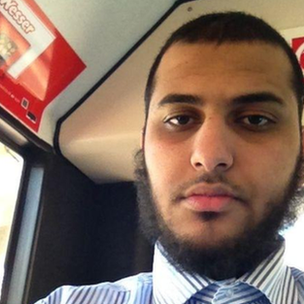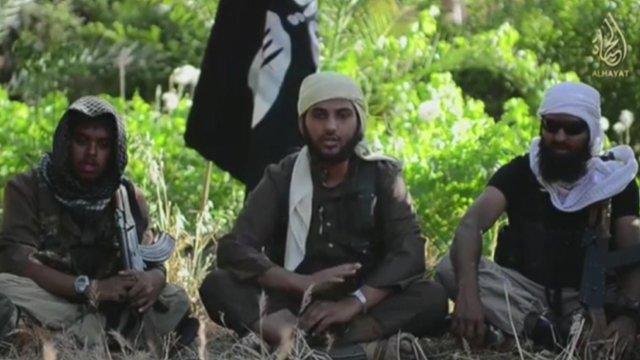Briton's jihad video leaves family 'heartbroken'
- Published
Ahmed Muthana, father of Nasser: "Somebody is driving those kids to do this"
The father of a British man who has appeared in a video aimed at recruiting jihadists has said he is "heartbroken" his son left the UK to fight in Syria.
In the film, would-be medical student Nasser Muthana, 20, from Cardiff, urges others to fight in Syria and Iraq.
His father, Ahmed Muthana, told the BBC his younger son had also gone to Syria.
The BBC understands two men who travelled with Nasser were held on suspicion of terror-related offences on their return to the UK but not charged.
South Wales Police said the men, aged 19 and 23 and from Cardiff, were arrested earlier this year on suspicion of receiving terrorist training and attending a place used for terrorist training in Syria.
Father's 'coffin' fear
Mr Muthana - whose son Nasser appears in the footage using the name Abu Muthanna al-Yemen - told BBC Wales his 17-year-old younger son, Aseel, had also travelled to the country.
He said another man in the video, which cannot be verified, was someone he recognised from Cardiff.

Nasser Muthana was described as quiet and intelligent
The footage emerged after militants led by jihadist group the Islamic State in Iraq and the Levant (Isis) made rapid advances through Iraq in recent weeks, seizing several northern cities and surrounding the country's biggest refinery.
Mr Muthana told the BBC he feared his sons would "come back to me in a coffin".
Asked about the video in which Nasser Muthana appears, he said: "I'm sad that he's gone without telling me he's going. He disappeared and, when I saw it on the television, I thought, 'What is he doing there?'"
He described his son - who had been offered places by four universities to study medicine - as quiet, well-educated and intelligent.
Nasser had left home in November, saying he was going to Leicester or Shrewsbury to study, said Mr Muthana.
"I received a phone call saying that he's in Turkey and that's it." He feared his son had now been radicalised.
"I don't think that's Nasser talking, it's someone else is teaching him to talk like this because the attitude of Nasser is 100% completely different," he said.
"Who led them to go there? Is he going to kill or do anything?
"Someone is driving those kids to do this problem. Ask those sheiks to send their sons and daughters to fight. They only send other people's children, making a problem for the whole community."
This footage purports to show Reyaad Khan (c) Nasser Muthana (r) from Wales
Barak Al Bayaty, a trustee for one of the Cardiff mosques attended by Nasser Muthana, said he might have been radicalised via the internet.
He said spiritual leaders at the mosque were opposed to going to Syria to participate in an armed struggle - and had made this clear.
Mr Al Bayaty said the issue needed to be addressed by the community as a whole.
"I'm a parent. We are alarmed, we are alarmed for our fellow citizens," he said.
He warned against "demonising the Muslim community itself", adding that "the vast majority of Muslim people are really worried about this situation and are working with us to try and identify those people that may be at risk".
Meanwhile, Saleem Kidwai - of the Muslim Council of Wales - said it was important for members of the Muslim community to have discussions with the police and politicians "to understand why this is happening".
"We have to look at the causes of it and deal with the situation. There's no point looking at the symptoms," he said.
Sir Peter Fahy, who heads the Prevent counter-terrorism strategy for the Association of Chief Police Officers, told the BBC about 500 British fighters were thought to be in Syria and Iraq.
Sir Peter Fahy, from the Association of Chief Police Officers: "This is the top priority for the counter-terrorist police and security services"
He said some estimates put the number even higher, with the true figure still unknown.
He added: "This isn't just a police issue - it's about working with schools, youth organisations, even people in the NHS. It's about trying to get the whole community to identify people who may be thinking about going to Syria."
UK police are trying to get the film, posted by accounts linked to Isis, taken offline.
The 13-minute video, entitled There is No Life Without Jihad, emerged on Friday.
It appears to show six fighters - apparently including three Britons - urging Muslims to join the conflicts abroad.

Isis in Iraq
In 60 seconds: What does Islamic State want?
Isis grew out of an al-Qaeda-linked organisation in Iraq
Estimated 10,000 fighters in Iraq and Syria
Joined in its offensives by other Sunni militant groups, including Saddam-era officers and soldiers, and disaffected Sunni tribal fighters
Exploits standoff between Iraqi government and the minority Sunni Arab community, which complains that Shia Prime Minister Nouri Maliki is monopolising power
Led by Abu Bakr al-Baghdadi, an obscure figure regarded as a battlefield commander and tactician

The Home Office said it wanted to "further restrict access to terrorist material" and use "family-friendly filters" to block other extremist content.
A spokesman for the Internet Services Providers' Association, which describes itself as the trade body for the UK's internet industry, said host companies could be asked to take material down or it could be filtered out.
A YouTube spokesman said the company had "clear policies prohibiting violent content or content intended to incite violence, and we remove videos violating these policies when flagged by our users".
- Published20 June 2014
